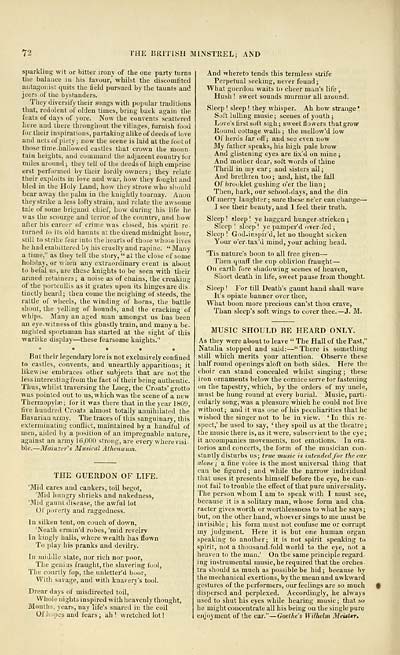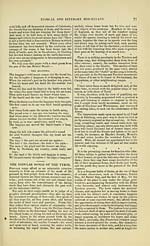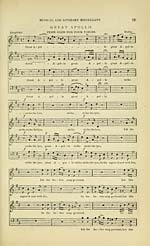Glen Collection of printed music > Printed music > British minstrel, and musical and literary miscellany
(410) Page 72
Download files
Complete book:
Individual page:
Thumbnail gallery: Grid view | List view

72
THE BRITISH MINSTREL; AND
sparkling wit or bitter irony of the one party turns
tlie balance in his favour, whilst the discomlited
antagonist quits the field pursued by the taunis and
jeers of the bystanders.
They diversify their Songs with popular traditions
that, redolent of olden times, bring back again the
feats of days of yore. Now the convents scattered
here and there throughout the villages, furnish food
for their inspirations, partaking alike o/^ deeds of love
and acts of piety; now the scene is laid at the foot of
those time-hailowed castles that crown the moun-
tain heights, and command the adjacent country for
miles around ; they tell of the deeds of high emprise
erst performed by their lordly owners; they relate
their exploits in love and war, how they fought and
bled in the Holy Land, how they strove who sliould
bear away the palm in the knightly tournay. Anon
they strike a less lofty strain, and relate the awsome
tale of some brigand chief, how during his life he
was the scourge and terror of the country, and how
after his career of crime was closed, his spirit re-
turned to its old haunts at the dread midnight hour,
still to strike fear into the hearts of those whose lives
he had embittered by his cruelty and rapine. " Many
a time," as they tell the story, " at the close of some
holiday, or when any extraordinary event is about
to befal us, are these knights to be seen with their
armed retainers; a noise as of chains, the creaking
of the portcullis as it grates upon its hinges are dis-
tinctly heard ; then come the neighing of steeds, the
rattle of wheels, the winding of horns, the battle
shout, the yelling of hounds, and the cracking of
whips. Blany an aged man amongst us has been
an eye-witness of this ghastly train, and many a be-
niglited sportsman has started at the sight of this
warlike display — these fearsome knights."
*****
But their legendary lore is not exclusively confined
to castles, convents, and unearthly apparitions; it
likewise embraces other subjects that are not the
less iuterestingfrom the fact of their being authentic.
Thus, whilst traversing the Lueg, the Croats' grotto
was pointed out to us,which was the scene of a new
Thermopylje; for it was there that in the year 1809,
live hundred Croats almost totally annihilated the
Bavarian army. The traces of this sanguinary, this
exterminating conflict, maintained by a handful of
men, aided by a position of an impregnable nature,
against an army 16,000 strong, are every where visi-
ble. — Mainzer's Musical Athenceum.
THE GUERDON OF LIFE.
'Mid cares and cankers, toil begot,
'Mid hungry shrieks and nakedness,
'Mid gaunt disease, the awful lot
Of poverty and raggeduess.
In silken tent, on couch of down,
'Neath ermin'd robes, 'mid revelry
In kingly halls, where wealth has flown
To play his pranks and devilry.
In middle state, nor rich nor poor.
The genius fraught, the slavering fool,
The courtly fop, the unletter'd boor,
With savage, and with knavery's tool.
Drear days of misdirected toil.
Whole nights inspired with heavenly thought.
Months, years, nay life's snared in the coil
Of hopes and fears ; ah ! wretched lot I
And whereto tends this termless strife
Perpetual seekmg, never found;
What guerdon waits to cheer man's life ,
Hush ! sweet sounds murmur all around.
Sleep ! sleep ! they whisper. Ah how strange '.
Suft lulhug music; scenes of youth ;
Love's first soft sigh; sweet flowers that grow
Round cottage walls ; the mellow'd low
Of herds far of}'; and see even now
My father speaks, his high pale brow
And glistening eyes are fix'd im mine ;
And mother dear, soft words of thine
Thrill in my ear ; and sisters all ;
And brethren too ; and, hist, the fall
Of brooklet gushing o'er the linn ;
Then, hark, our school-days, and the din
Of merry laughter ; sure these ne'er can change — •
I see their beauty, and I feel their truth.
Sleep ! sleep I ye haggard hunger-stricken ;
Sleep I sleep ! ye pamper'd over- fed;
Sleep ! God-inspir'd, let no thought sicken
Your o'er-tax'd mind, your aching head.
'Tis nature's boon to all free given —
Then quaff the cup oblivion fraught —
On eai'th fore shadowing scenes of heaven,
Short death in life, sweet pause from thought.
Sleep ! For till Death's gaunt hand shall wave
It's opiate banner over thee.
What boon more precious can'st thou crave.
Than sleep's soft wings to cover thee. — J. M.
MUSIC SHOULD BE HEARD ONLY.
As they were about to leave " The Hall of the Past,"
Natalia stopped and said: — "There is something
still which merits your attention. Observe these
half round openings aloft on both sides. Here the
choir can stand concealed whilst singing ; these
iron ornaments below the cornice serve lor fastening
on the tapestry, which, by the orders of my uncle,
must be hung round at every burial. Music, parti-
cularly song, was a pleasure which he could not live
without; and it Was one of his peculiarities that he
wished the singer not to be in view. ' In this re-
spect,' he used to say, ' they spoil us at the theatre ;
the music there is, as it were, subservient to the eye ;
it accompanies movements, not emotions. In ora-
torios and concerts, the form of the musician con-
stantly disturbs us; true music is intended for the ear
alone; a fine voice is the most universal thing that
can be figured; and while the narrow individual
that uses it presents himself before the eye, he can-
not fail to trouble the effect of that pure universality.
The person whom I am to speak with I must see,
because it is a solitary man, whose form and cha-
racter gives worth or worthlessness to what he says;
but, on the other hand, whoever sings to me must be
invisible; his form must not confuse me or corrupt
my judgment. Here it is but one human organ
speaiing to another; it is not spirit speaking to
spirit, not a thousand-fold world to the eye, not a
heaven to the man.' On the same principle regard-
ing instrumental music, he required that the orches-
tra should as much as possible be hid ; because by
the mechanical exertions, by the mean and awkward
gestures of the performers, our feelings are so much f
dispersed and perplexed. Accordingly, he always
used to shut his eyes while hearing music ; that so
he might concentrate all his being on the single pure
enjoyment of the ear." — Goethe's Wilhelm Meistir.
THE BRITISH MINSTREL; AND
sparkling wit or bitter irony of the one party turns
tlie balance in his favour, whilst the discomlited
antagonist quits the field pursued by the taunis and
jeers of the bystanders.
They diversify their Songs with popular traditions
that, redolent of olden times, bring back again the
feats of days of yore. Now the convents scattered
here and there throughout the villages, furnish food
for their inspirations, partaking alike o/^ deeds of love
and acts of piety; now the scene is laid at the foot of
those time-hailowed castles that crown the moun-
tain heights, and command the adjacent country for
miles around ; they tell of the deeds of high emprise
erst performed by their lordly owners; they relate
their exploits in love and war, how they fought and
bled in the Holy Land, how they strove who sliould
bear away the palm in the knightly tournay. Anon
they strike a less lofty strain, and relate the awsome
tale of some brigand chief, how during his life he
was the scourge and terror of the country, and how
after his career of crime was closed, his spirit re-
turned to its old haunts at the dread midnight hour,
still to strike fear into the hearts of those whose lives
he had embittered by his cruelty and rapine. " Many
a time," as they tell the story, " at the close of some
holiday, or when any extraordinary event is about
to befal us, are these knights to be seen with their
armed retainers; a noise as of chains, the creaking
of the portcullis as it grates upon its hinges are dis-
tinctly heard ; then come the neighing of steeds, the
rattle of wheels, the winding of horns, the battle
shout, the yelling of hounds, and the cracking of
whips. Blany an aged man amongst us has been
an eye-witness of this ghastly train, and many a be-
niglited sportsman has started at the sight of this
warlike display — these fearsome knights."
*****
But their legendary lore is not exclusively confined
to castles, convents, and unearthly apparitions; it
likewise embraces other subjects that are not the
less iuterestingfrom the fact of their being authentic.
Thus, whilst traversing the Lueg, the Croats' grotto
was pointed out to us,which was the scene of a new
Thermopylje; for it was there that in the year 1809,
live hundred Croats almost totally annihilated the
Bavarian army. The traces of this sanguinary, this
exterminating conflict, maintained by a handful of
men, aided by a position of an impregnable nature,
against an army 16,000 strong, are every where visi-
ble. — Mainzer's Musical Athenceum.
THE GUERDON OF LIFE.
'Mid cares and cankers, toil begot,
'Mid hungry shrieks and nakedness,
'Mid gaunt disease, the awful lot
Of poverty and raggeduess.
In silken tent, on couch of down,
'Neath ermin'd robes, 'mid revelry
In kingly halls, where wealth has flown
To play his pranks and devilry.
In middle state, nor rich nor poor.
The genius fraught, the slavering fool,
The courtly fop, the unletter'd boor,
With savage, and with knavery's tool.
Drear days of misdirected toil.
Whole nights inspired with heavenly thought.
Months, years, nay life's snared in the coil
Of hopes and fears ; ah ! wretched lot I
And whereto tends this termless strife
Perpetual seekmg, never found;
What guerdon waits to cheer man's life ,
Hush ! sweet sounds murmur all around.
Sleep ! sleep ! they whisper. Ah how strange '.
Suft lulhug music; scenes of youth ;
Love's first soft sigh; sweet flowers that grow
Round cottage walls ; the mellow'd low
Of herds far of}'; and see even now
My father speaks, his high pale brow
And glistening eyes are fix'd im mine ;
And mother dear, soft words of thine
Thrill in my ear ; and sisters all ;
And brethren too ; and, hist, the fall
Of brooklet gushing o'er the linn ;
Then, hark, our school-days, and the din
Of merry laughter ; sure these ne'er can change — •
I see their beauty, and I feel their truth.
Sleep ! sleep I ye haggard hunger-stricken ;
Sleep I sleep ! ye pamper'd over- fed;
Sleep ! God-inspir'd, let no thought sicken
Your o'er-tax'd mind, your aching head.
'Tis nature's boon to all free given —
Then quaff the cup oblivion fraught —
On eai'th fore shadowing scenes of heaven,
Short death in life, sweet pause from thought.
Sleep ! For till Death's gaunt hand shall wave
It's opiate banner over thee.
What boon more precious can'st thou crave.
Than sleep's soft wings to cover thee. — J. M.
MUSIC SHOULD BE HEARD ONLY.
As they were about to leave " The Hall of the Past,"
Natalia stopped and said: — "There is something
still which merits your attention. Observe these
half round openings aloft on both sides. Here the
choir can stand concealed whilst singing ; these
iron ornaments below the cornice serve lor fastening
on the tapestry, which, by the orders of my uncle,
must be hung round at every burial. Music, parti-
cularly song, was a pleasure which he could not live
without; and it Was one of his peculiarities that he
wished the singer not to be in view. ' In this re-
spect,' he used to say, ' they spoil us at the theatre ;
the music there is, as it were, subservient to the eye ;
it accompanies movements, not emotions. In ora-
torios and concerts, the form of the musician con-
stantly disturbs us; true music is intended for the ear
alone; a fine voice is the most universal thing that
can be figured; and while the narrow individual
that uses it presents himself before the eye, he can-
not fail to trouble the effect of that pure universality.
The person whom I am to speak with I must see,
because it is a solitary man, whose form and cha-
racter gives worth or worthlessness to what he says;
but, on the other hand, whoever sings to me must be
invisible; his form must not confuse me or corrupt
my judgment. Here it is but one human organ
speaiing to another; it is not spirit speaking to
spirit, not a thousand-fold world to the eye, not a
heaven to the man.' On the same principle regard-
ing instrumental music, he required that the orches-
tra should as much as possible be hid ; because by
the mechanical exertions, by the mean and awkward
gestures of the performers, our feelings are so much f
dispersed and perplexed. Accordingly, he always
used to shut his eyes while hearing music ; that so
he might concentrate all his being on the single pure
enjoyment of the ear." — Goethe's Wilhelm Meistir.
Set display mode to: Large image | Transcription
Images and transcriptions on this page, including medium image downloads, may be used under the Creative Commons Attribution 4.0 International Licence unless otherwise stated. ![]()
| Special collections of printed music > Glen Collection of printed music > Printed music > British minstrel, and musical and literary miscellany > (410) Page 72 |
|---|
| Permanent URL | https://digital.nls.uk/91439865 |
|---|
| Description | Scottish songs and music of the 18th and early 19th centuries, including music for the Highland bagpipe. These are selected items from the collection of John Glen (1833 to 1904). Also includes a few manuscripts, some treatises, and other books on the subject. |
|---|
| Description | The Glen Collection and the Inglis Collection represent mainly 18th and 19th century Scottish music, including Scottish songs. The collections of Berlioz and Verdi collected by bibliographer Cecil Hopkinson contain contemporary and later editions of the works of the two composers Berlioz and Verdi. |
|---|

